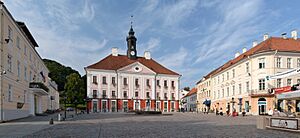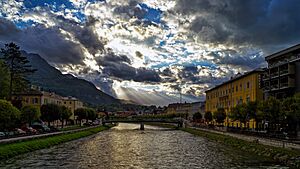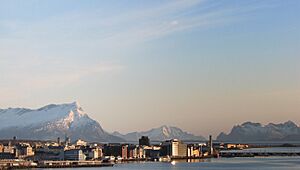European Capital of Culture facts for kids
A European Capital of Culture is a city designated by the European Union (EU) for a period of one calendar year during which it organises a series of cultural events with a strong pan-European dimension. Being a European Capital of Culture can be an opportunity for a city to generate considerable cultural, social, and economic benefits, and it can help foster urban regeneration, change the city's image, and raise its visibility and profile on an international scale. Multiple cities can be a European Capital of Culture simultaneously.
In 1985, Melina Mercouri, Greece's Minister of Culture, and her French counterpart Jack Lang came up with the idea of designating an annual City of Culture to bring Europeans closer together by highlighting the richness and diversity of European cultures and raising awareness of their common history and values.
The Commission of the European Union manages the title, and each year the Council of Ministers of the European Union formally designates European Capitals of Culture: more than 40 cities have been designated so far. The current European Capitals of Culture for 2024 are Tartu in Estonia, Bad Ischl in Austria and Bodø in Norway.
Selection process
An international panel of cultural experts is in charge of assessing the proposals of cities for the title according to criteria specified by the European Union.
For two of the capitals each year, eligibility is open to cities in EU member states only. From 2021 and every three years thereafter, a third capital will be chosen from cities in countries that are candidates or potential candidates for membership, or in countries that are part of the European Economic Area (EEA)– an example of the latter being Stavanger, Norway, which was a European Capital of Culture in 2008.
A 2004 study conducted for the Commission, known as the "Palmer report", demonstrated that the choice of European Capital of Culture served as a catalyst for cultural development and the transformation of the city. Consequently, the beneficial socio-economic development and impact for the chosen city are now also considered in determining the chosen cities.
Bids from five United Kingdom cities to be the 2023 Capital of Culture were disqualified in November 2017, because the UK was planning to leave the EU before 2023.
History
The European Capital of Culture programme was initially called the European City of Culture and was conceived in 1983, by Melina Mercouri, then serving as minister of culture in Greece. Mercouri believed that at the time, culture was not given the same attention as politics and economics and a project for promoting European cultures within the member states should be pursued. The European City of Culture programme was launched in the summer of 1985 with Athens being the first title-holder. In 1999, the European City of Culture program was renamed to European Capital of Culture.
List of European Capitals of Culture

| Year | # | City | Country | Notes/Links |
|---|---|---|---|---|
| 1985 | Athens | |||
| 1986 | Florence | |||
| 1987 | Amsterdam | |||
| 1988 | West Berlin | City under Western Allied occupation until 1990; territory was claimed by the Federal Republic of Germany. The name "European City of Culture" was used instead of "Capital" in order to not provoke the East German government. | ||
| 1989 | Paris | |||
| 1990 | Glasgow | Glasgow Garden Festival | ||
| 1991 | Dublin | |||
| 1992 | Madrid | |||
| 1993 | Antwerp | |||
| 1994 | Lisbon | |||
| 1995 | Luxembourg City | |||
| 1996 | Copenhagen | |||
| 1997 | Thessaloniki | |||
| 1998 | Stockholm | |||
| 1999 | Weimar | |||
| 2000 | Avignon | The year 2000 was called the millennium year and treated in a special way, in order to emphasize the enduring heritage and contribution of European cities to world culture and civilization. Because of that, nine locations were chosen, including two cities of states that were to join the EU on 1 May 2004. | ||
| Bergen | ||||
| Bologna | ||||
| Brussels | ||||
| Helsinki | ||||
| Kraków | ||||
| Prague | ||||
| Reykjavík | ||||
| Santiago de Compostela | ||||
| 2001 | Rotterdam | |||
| Porto | ||||
| 2002 | Bruges | |||
| Salamanca | ||||
| 2003 | Graz | |||
| 2004 | Genoa | |||
| Lille | ||||
| 2005 | Cork | Cork Caucus | ||
| 2006 | Patras | |||
| 2007 | Sibiu | |||
| Luxembourg City | ||||
| 2008 | Liverpool | |||
| Stavanger | ||||
| 2009 | Vilnius | |||
| Linz | Linz 2009 | |||
| 2010 | Essen | Representing the whole Ruhr as Ruhr.2010. | ||
| Istanbul | ||||
| Pécs | ||||
| 2011 | Turku | |||
| Tallinn | ||||
| 2012 | Guimarães | |||
| Maribor | ||||
| 2013 | Marseille | Marseille-Provence 2013 | ||
| Košice | ||||
| 2014 | Riga | |||
| Umeå | ||||
| 2015 | Mons | |||
| Plzeň | ||||
| 2016 | San Sebastián | Donostia 2016 | ||
| Wrocław | ||||
| 2017 | Aarhus | Aarhus 2017 | ||
| Paphos | Pafos 2017 | |||
| 2018 | Leeuwarden | |||
| Valletta | Valletta 2018 | |||
| 2019 | Matera | |||
| Plovdiv | Plovdiv 2019 | |||
| 2020 – April 2021 | Rijeka | Rijeka 2020 | ||
| Galway | ||||
| 2022 | Kaunas | Kaunas 2022 | ||
| Esch-sur-Alzette | Esch-sur-Alzette 2022 | |||
| Novi Sad | Novi Sad 2022 (Coronavirus postponement) | |||
| 20231 | Veszprém | Veszprém 2023 | ||
| Timișoara | Timișoara 2023 (Coronavirus postponement) | |||
| Eleusis | Eleusis 2023 (Coronavirus postponement) | |||
| 2024 | 1 | Tartu | Tartu 2024 | |
| 2 | Bad Ischl | Salzkammergut 2024 | ||
| 32 | Bodø | Bodø 2024 | ||
| 2025 | Nova Gorica/Gorizia joint bid | GO! 2025 | ||
| Chemnitz | Chemnitz 2025 | |||
| 2026 | Trenčín | Trenčín 2026 | ||
| Oulu | Oulu 2026 | |||
| 2027 | Liepāja | Liepāja 2027 | ||
| Évora | Évora 2027 | |||
| 2028 | 1 | České Budějovice | České Budějovice 2028 | |
| 2 | Bourges | Bourges 2028 | ||
| 32 | Skopje | Skopje 2028 | ||
| 2029 | Lublin | Lublin 2029 | ||
| TBA December 2024 | shortlisted: Kiruna, Uppsala | |||
| 2030 | 1 | TBA | deadline 13 December 2024 | |
| 2 | pre-selection 21 October 2024 |
candidate cities: Bruges, Ghent, Kortrijk, Leuven, Molenbeek, Namur | ||
| 32 | TBA | TBA | deadline 16 September 2024 | |
| 2031 | TBA | candidate cities: Birgu, Gozo | ||
| TBA | potential candidate cities: Burgos, Cáceres, Granada, Jerez de la Frontera | |||
| 2032 | TBA | potential candidate cities: Veliko Tarnovo | ||
| TBA | potential candidate cities: Næstved | |||
| 2033 | 1 | TBA | potential candidate city: Heerlen | |
| 2 | TBA | potential candidate city: Turin | ||
| 32 | TBA | TBA |
1 The European Capital of Culture was due to be in the UK in 2023. However, due to its decision to leave the European Union, UK cities would no longer be eligible to hold the title after 2019. The European Commission's Scotland office confirmed that this would be the case on 23 November 2017, only one week before the UK was due to announce which city would be put forward. The candidate cities were Dundee, Leeds, Milton Keynes, Nottingham and a joint bid from Northern Irish cities of Belfast and Derry and the town of Strabane.
2 A new framework makes it possible for cities in candidate countries (Albania, Bosnia and Herzegovina, Georgia, Moldova, Montenegro, North Macedonia, Serbia, Turkey, Ukraine), potential candidates for EU membership (Kosovo) or EFTA member states (Iceland, Liechtenstein, Norway, Switzerland) to hold the title every third year as of 2021. This will be selected through an open competition, meaning that cities from various countries may compete with each other.
See also
 In Spanish: Capital Europea de la Cultura para niños
In Spanish: Capital Europea de la Cultura para niños





